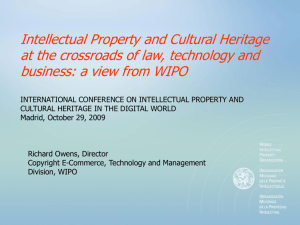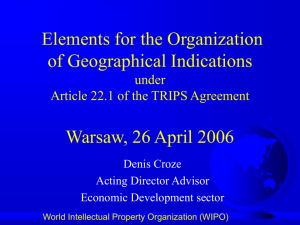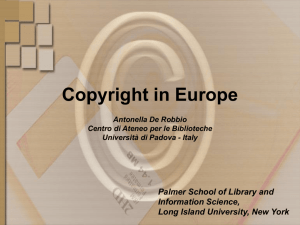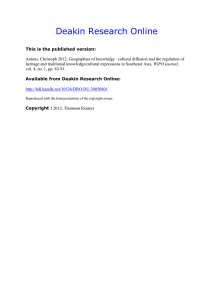Indigenous Peoples Forum 2005
advertisement
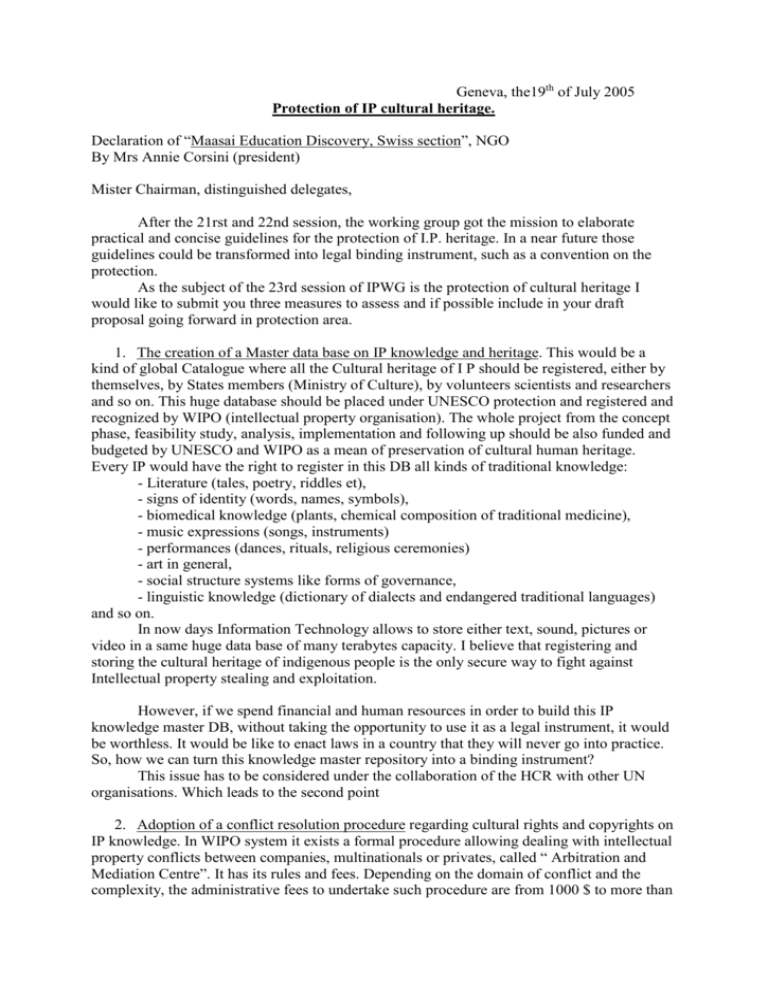
Geneva, the19th of July 2005 Protection of IP cultural heritage. Declaration of “Maasai Education Discovery, Swiss section”, NGO By Mrs Annie Corsini (president) Mister Chairman, distinguished delegates, After the 21rst and 22nd session, the working group got the mission to elaborate practical and concise guidelines for the protection of I.P. heritage. In a near future those guidelines could be transformed into legal binding instrument, such as a convention on the protection. As the subject of the 23rd session of IPWG is the protection of cultural heritage I would like to submit you three measures to assess and if possible include in your draft proposal going forward in protection area. 1. The creation of a Master data base on IP knowledge and heritage. This would be a kind of global Catalogue where all the Cultural heritage of I P should be registered, either by themselves, by States members (Ministry of Culture), by volunteers scientists and researchers and so on. This huge database should be placed under UNESCO protection and registered and recognized by WIPO (intellectual property organisation). The whole project from the concept phase, feasibility study, analysis, implementation and following up should be also funded and budgeted by UNESCO and WIPO as a mean of preservation of cultural human heritage. Every IP would have the right to register in this DB all kinds of traditional knowledge: - Literature (tales, poetry, riddles et), - signs of identity (words, names, symbols), - biomedical knowledge (plants, chemical composition of traditional medicine), - music expressions (songs, instruments) - performances (dances, rituals, religious ceremonies) - art in general, - social structure systems like forms of governance, - linguistic knowledge (dictionary of dialects and endangered traditional languages) and so on. In now days Information Technology allows to store either text, sound, pictures or video in a same huge data base of many terabytes capacity. I believe that registering and storing the cultural heritage of indigenous people is the only secure way to fight against Intellectual property stealing and exploitation. However, if we spend financial and human resources in order to build this IP knowledge master DB, without taking the opportunity to use it as a legal instrument, it would be worthless. It would be like to enact laws in a country that they will never go into practice. So, how we can turn this knowledge master repository into a binding instrument? This issue has to be considered under the collaboration of the HCR with other UN organisations. Which leads to the second point 2. Adoption of a conflict resolution procedure regarding cultural rights and copyrights on IP knowledge. In WIPO system it exists a formal procedure allowing dealing with intellectual property conflicts between companies, multinationals or privates, called “ Arbitration and Mediation Centre”. It has its rules and fees. Depending on the domain of conflict and the complexity, the administrative fees to undertake such procedure are from 1000 $ to more than 5000 $. We could suggest that in the case in which an IP representative deposits a complaint, WIPO should offer free mediation procedure. If for example an IP NGO complains about a music company which has commercialised unauthorized traditional music without paying any royalty to them. Or an IP representative who denunciates a pharmaceutical company for illicit reproduction of a medical composition. I think this is a typical case of collaboration between UN agencies : WIPO could collaborate with HCR and offer to IP free ACR (alternative conflict resolution) procedure. 3. If we go in depth with this process (denouncing violations of cultural rights of IP) I would like to suggest adopting the same approach with violations of Human Rights. Meaning, the working group could suggest the introduction of a confidential and secure procedure of denunciating violation of Cultural knowledge and heritage, kept confidential until an alternative conflict resolution procedure is fixed and both parties are invited to negotiate in a profit sharing basis, respectful for both parties interests. This registration procedure could be viewed as an incident reporting tool on violations of IP rights and intellectual property. And of course the aim is not simply registering but undertaking afterwards an alternative conflict resolution procedure. Thank you








